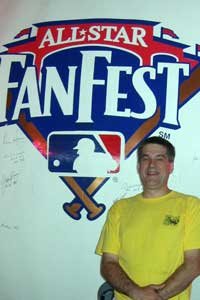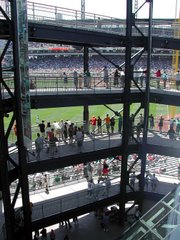Thanks to Mother Nature, the Cleveland Indians are making a road trip to Milwaukee for some "home" games vs. the Angels. With snow blowing in from Lake Erie for the past week, the Indians hadn't been able to play a full game since last Wednesday.
I've heard various commentators whining about the scheduling of early April games up north. But it's not every year that winter returns with such vengeance, and everyone but Indians fans will have pretty much forgotten about the relocated games once the temperature hits the 70s.
There is precedent for teams rescheduling home games in other cities, with a very notable instance involving Cleveland.
For most of the 1890s, the National League was the only recognized major league. With a monopoly in place, the team owners did what they could to maximize their profits, including shifting games from cities that didn't draw well to ones that did. As a result, subpar teams in, say, Washington and Louisville played far fewer home games each year than Boston and New York.
Another practice of the 1890s was "syndicate ownership," in which an individual or group could own a stake in more than one team. If an owner felt he could make more money in one city compared with another, he simply transferred the best players to the better prospect.
In 1898, brothers Frank and Stanley Robison, who owned the team in Cleveland (then known as the Spiders), purchased the St. Louis Browns. Figuring they could grab more cash in the Gateway City, the Robisons sent practically all the Spiders of major-league caliber west.
About the only decent player remaining was Lave Cross, who was "rewarded" by being named manager of what looked to be a lousy team.
"Lousy" doesn't even begin to describe what happened in Cleveland in 1899. The Spiders got off to a miserable 8-30 start, and Cross turned in his resignation, subsequently joining his former teammates in St. Louis. Veteran Joe Quinn (the first native Australian to play in the majors), the Spiders' second baseman, took Cross' place at the helm. Under his direction, the team won another dozen games.
That adds up to 20 wins for the season ... in 154 games.
Understandably, hardly anyone was showing up to see the Spiders in Cleveland. So in late June a local newspaper reported: "The Cleveland team, owing to lack of support, will be withdrawn from the Forest City after July 1 and will play the balance of the schedule on foreign ground." One of the reasons: "This year, the gate receipts at the grounds of the Cleveland Club have not averaged much over $25 per day."
The article ends on a prescient note: "And so good-bye forever to Cleveland as a National League city." Sure enough, the Spiders folded after 1899, and the team now known as the Indians joined the American League at its start in 1901.
During its perpetual road trip, the '99 Spiders had exactly one highlight: On Sept. 18, they squeezed out a 5-4 victory over next-to-last-place Washington. Before the game, Cleveland had lost 24 in a row. After that, they closed the season with 17 losses in a row.
By comparison, maybe today's Cleveland fans shouldn't complain too much about a few "home" games being moved to Milwaukee.
Trivia question 12: One member of the 1898 Spiders who ended up in St. Louis was a pitcher whose name still is mentioned regularly today. Who was he?
Subscribe to:
Post Comments (Atom)









No comments:
Post a Comment